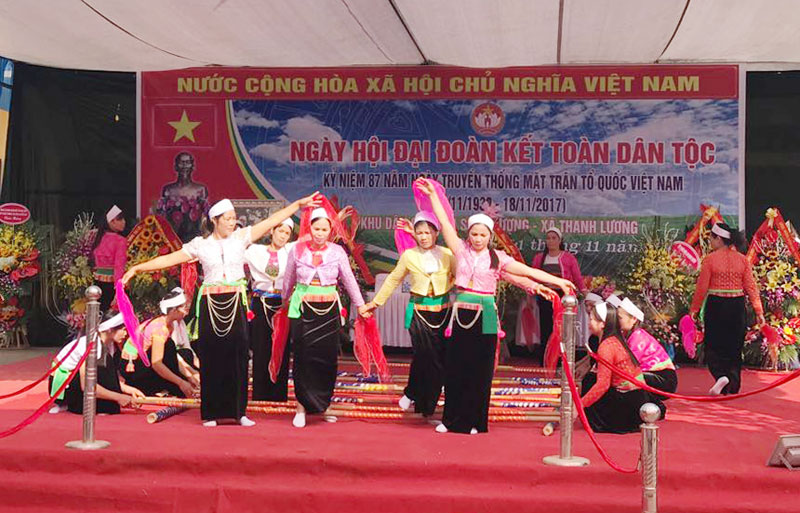
(HBO) - Located 40 km away from the center of Luong Son district, Thanh Luong commune has 6 hamlets with 915 households and 4,260 people of Kinh and Muong ethnic groups. Responding to the campaign "All people unite to build cultural life in residential areas", the locality has achieved many positive results and created positive changes in local socio-economic development in recent years.

Residents
of Thanh Luong’s Sau Thuong hamlet actively participate in cultural activities
welcoming big events of the year.
In 2017, the entire commune had 725 households recognised as cultural
families, 750 households as sporty families and 5 out of six residential units
as cultural residential areas.
Putting people’s interests as the top priority, Thanh Luong has focused
on specific tasks to bring a facelift to the rural areas, and enhance the
spiritual and material life for local residents. Local authorities and social
organisations have joined hands to run numerous campaigns to involve all
residents in socio-economic development. Some outstanding campaigns are "women
helping each other develop household production”, "veterans contributing to
new-style rural building”, "farmers doing business”, "youths going for
self-improvement and career building”, among others. They have reduced poverty
and formed new business models.
In 2017, Sau Thuong hamlet was accredited as a cultural
residential area for the third consecutive year, with 197 local households, recognised
as cultural families. Among them, 132 households earned the title for three
consecutive years. The hamlet has 218 households with 960 people, 85 percent of
whom are from the Muong ethnic community. Local residents voluntarily donated
land to build roads and actively participated in public activities.
Thanks to local concerted efforts, Thanh Luong completed its goal
of becoming a new-style rural area in January 2018. To date, more than 59
percent of the local workforce have received vocational training; 100 percent of
households have access to electricity and the internet. Meanwhile, 100 percent
of its hamlets have their own standardised cultural houses and sport centres./.
Thanks to the development of social networks, Thung waterfall is gradually becoming known as a new destination, attracting tourists from inside and outside the province thanks to its wild beauty. This is a positive sign opening up opportunities for tourism development in the mountainous commune of Quyet Chien, Tan Lac district.
Da Bac district has pinpointed culture as a key driver of tourism development, a direction clearly outlined in the Resolution of the 25th district Party Congress for the 2020-2025 tenure.
Go Lao waterfall in Go Mu hamlet, Son Thuy commune, Mai Chau district is a hidden gem of the northern mountainous province of Hoa Binh.
In the first 9 months of 2024, Hoa Binh province continues to implement the expanded tourism development cooperation program plan of 8 Northwest provinces with Ho Chi Minh City; deploying digital transformation content in tourism and developing a smart tourism province. Hoa Binh province received about 3.6 million views, an increase of 7.9% over the same period. In which, international visitors are about 380 visitors, domestic visitors are estimated at 3 million 220 visitors.
Spanning thousands of hectares and winding gracefully along mountain slopes, hillsides, and riverbanks, the terraced rice fields of Lac Son District present a stunning and captivating beauty. This region, renowned for its remarkable terraced landscapes, is also the centre of Hoa Binh Culture known for numerous archaeological sites.
The life of Mong people in Hang Kia and Pa Co communes of Mai Chau district has improved much thanks to tourism development.



